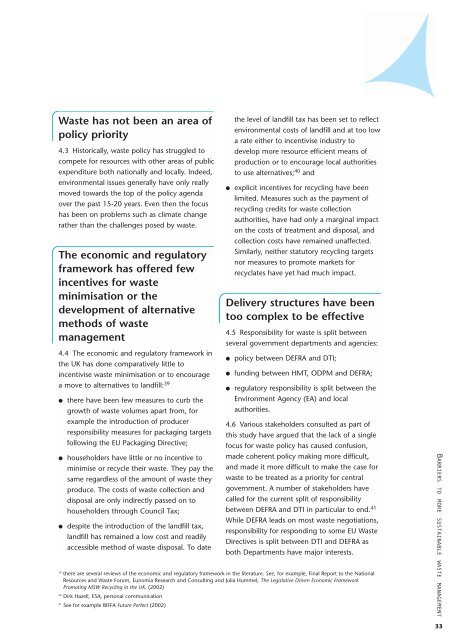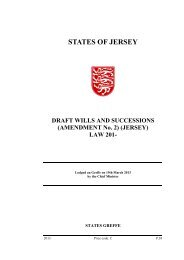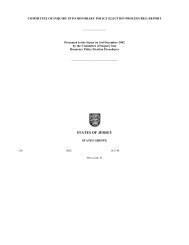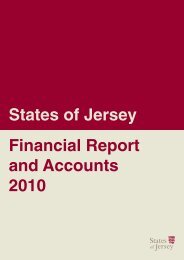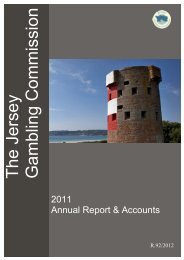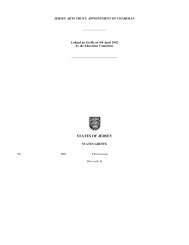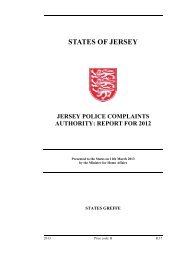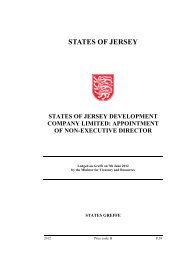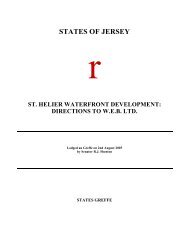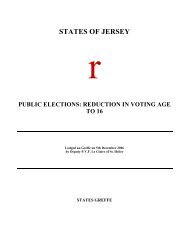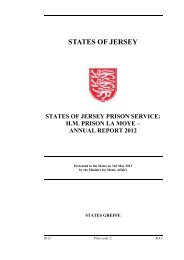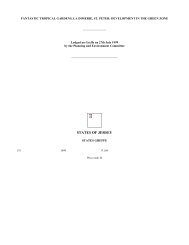Waste not want not - States Assembly
Waste not want not - States Assembly
Waste not want not - States Assembly
You also want an ePaper? Increase the reach of your titles
YUMPU automatically turns print PDFs into web optimized ePapers that Google loves.
<strong>Waste</strong> has <strong>not</strong> been an area of<br />
policy priority<br />
4.3 Historically, waste policy has struggled to<br />
compete for resources with other areas of public<br />
expenditure both nationally and locally. Indeed,<br />
environmental issues generally have only really<br />
moved towards the top of the policy agenda<br />
over the past 15-20 years. Even then the focus<br />
has been on problems such as climate change<br />
rather than the challenges posed by waste.<br />
The economic and regulatory<br />
framework has offered few<br />
incentives for waste<br />
minimisation or the<br />
development of alternative<br />
methods of waste<br />
management<br />
4.4 The economic and regulatory framework in<br />
the UK has done comparatively little to<br />
incentivise waste minimisation or to encourage<br />
a move to alternatives to landfill: 39<br />
●<br />
●<br />
●<br />
there have been few measures to curb the<br />
growth of waste volumes apart from, for<br />
example the introduction of producer<br />
responsibility measures for packaging targets<br />
following the EU Packaging Directive;<br />
householders have little or no incentive to<br />
minimise or recycle their waste. They pay the<br />
same regardless of the amount of waste they<br />
produce. The costs of waste collection and<br />
disposal are only indirectly passed on to<br />
householders through Council Tax;<br />
despite the introduction of the landfill tax,<br />
landfill has remained a low cost and readily<br />
accessible method of waste disposal. To date<br />
●<br />
the level of landfill tax has been set to reflect<br />
environmental costs of landfill and at too low<br />
a rate either to incentivise industry to<br />
develop more resource efficient means of<br />
production or to encourage local authorities<br />
to use alternatives; 40 and<br />
explicit incentives for recycling have been<br />
limited. Measures such as the payment of<br />
recycling credits for waste collection<br />
authorities, have had only a marginal impact<br />
on the costs of treatment and disposal, and<br />
collection costs have remained unaffected.<br />
Similarly, neither statutory recycling targets<br />
nor measures to promote markets for<br />
recyclates have yet had much impact.<br />
Delivery structures have been<br />
too complex to be effective<br />
4.5 Responsibility for waste is split between<br />
several government departments and agencies:<br />
●<br />
●<br />
●<br />
policy between DEFRA and DTI;<br />
funding between HMT, ODPM and DEFRA;<br />
regulatory responsibility is split between the<br />
Environment Agency (EA) and local<br />
authorities.<br />
4.6 Various stakeholders consulted as part of<br />
this study have argued that the lack of a single<br />
focus for waste policy has caused confusion,<br />
made coherent policy making more difficult,<br />
and made it more difficult to make the case for<br />
waste to be treated as a priority for central<br />
government. A number of stakeholders have<br />
called for the current split of responsibility<br />
between DEFRA and DTI in particular to end. 41<br />
While DEFRA leads on most waste negotiations,<br />
responsibility for responding to some EU <strong>Waste</strong><br />
Directives is split between DTI and DEFRA as<br />
both Departments have major interests.<br />
39<br />
there are several reviews of the economic and regulatory framework in the literature. See, for example, Final Report to the National<br />
Resources and <strong>Waste</strong> Forum, Eunomia Research and Consulting and Julia Hummel, The Legislative Driven Economic Framework<br />
Promoting MSW Recycling in the UK. (2002)<br />
40<br />
Dirk Hazell, ESA, personal communication<br />
41<br />
See for example BIFFA Future Perfect (2002)<br />
BARRIERS TO MORE SUSTAINABLE WASTE MANAGEMENT<br />
33


